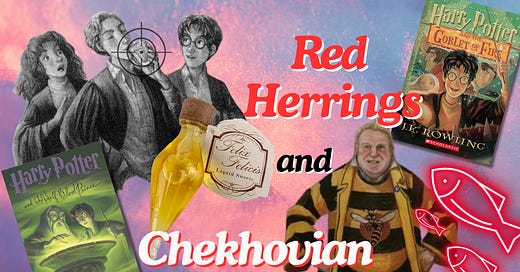Recently, I took a seminar with The Writing Pad “Crime Scene Confidential: Mystery Writing For TV.” It was very informative and that kind of learning that’s fun!
Two tools our teacher instructed us to use as often as possible were Red Herrings and Chekhovian Guns.
We all know what a red herring is. It’s a false lead. It’s Ludo Bagman in Harry Potter and the Goblet of Fire.
I was on the edge of my seat for the latter, because I’d misheard it as “Jacobian Gun” and was imagining some Quaker or Jesuit metaphor I hadn’t heard before. Alas I was disappointed. “Chekhovian Gun” apparently is how tv writers refer to “Chekhov's Gun,” with which I was familiar. (Full disclosure I didn’t recall the phenomenon was tied to Chekhov, but I was aware of the assertion, “if a gun is brought on stage, it must go off by the end of act one,” or whatever.)
The Toronto Film School defines it as such
Chekhov’s Gun is a narrative principle where an element introduced into a story first seems unimportant but will later take on great significance. The principle postulates that any seemingly unimportant element introduced into a story—an object, a character trait, a backstory, an allergy—should later have relevance.
So basically, the felix felicis in Harry Potter and the Half Blood Prince. (Yes, all literary examples come back to my beloved childhood fantasy series; sue me.)
This got me thinking about my Elsbeth spec script, because in my outline I kept dropping details that could lead down different paths. This is because I wasn’t sure how to write a compelling mystery procedural, especially in a format that reveals the crime and the killer in act one. I was dropping random information throughout that could develop the sleuthing, or lead the audience astray. (Which is wasteful as the audience is not trying to solve the mystery, but deduce how Elsbeth solves it before she reveals her thought process.)
I’m going to take a step back to my outline phase and do a pass focusing on Red Herrings and Chekhovian Guns. I will make sure every detail either follows a significant false lead or becomes pertinent later in my script. I can’t just leave extra details “to distract.” This violates the viewers trust.
Now that I break this down with Elsbeth specifically, I worry I never understood the purpose of the show (or I’ve now made it way too meta).
This train of thought made me think about novels, and fantasy series specifically.
For me Fourth Wing by Rebecca Yarros was a near perfect book. I know there is a contingent of the internet that insists it’s the most overrated garbage lacking character development and depth, but I disagree on like 75 different fronts. However my obsession with this series fell off near completely with the sequel Iron Flame. It turns out, I don’t trust Rebecca Yarros as a fantasy writer. JK Rowling and Sarah J. Maas are imperfect people, but they know how to write a fantasy saga. I can trust and believe every detail matters. I trust these authors to take me on a worthwhile ride that will not disappoint. Whether I predict the twists or not, they’re always satisfying. However Rebecca has not earned that faith from me. And after reading Iron Flame, the series feels filled with superfluous details.
Our instructor also said it is very important to know how the whole story will end when you start it. That way character, world-building, and motivations are consistent, but most importantly, satisfying to your viewer. Even if they don’t like a character’s ending, they can respect and appreciate it. I thought a solid example of this is the final season of Game of Thrones. The showrunners went past the books. I came to the show after it was off the air, but I imagine the disappointing elements of the last season were all because it was wrapped up in a way the writers did not predict from the get go. It was ludicrous and ruined the whole well thought out series in many ways.
Zero Days by Ruth Ware is an English thriller novel that stunk! It’s disappointment stemmed from the “guns” dropped left and right that must have had their safeties jammed. The story begins with her husband being killed while they were working on a “job” and it seems to clearly have been a trap. However in the end that’s never addressed. It’s just the thing that got them to be separated for this crime to happen. Like what? There is so much that disappoints in this story, but that is by far the most frustrating. It’s not even a spoiler because literally nothing happens with that storyline. If Ruth Ware didn’t want it to be related, I think she could have used it as a red herring and had our protagonist investigate the possibility, instead of leaving a stale breadcrumb.
I’m sure I had a point with this piece, but I’m blanking. Maybe it’s for writers to “shoot responsibly.” If you’re going to drop a bomb, it has to go off. So don’t go planting landmines just for the heck of it.
Hyperfixation du Jour: the Acela train
I went to visit my friends in DC this weekend, [shoutout supporter Blake], and it was my first Amtrak experience, and first time on an Acela. It’s the high speed train that runs from Boston to Washington DC and every car is “business class.” Very Nice!
I’d love to see the Amtrak expand further south and around the country. It’s a great way to travel! It’s cheaper to get to and from train stations than airports, and a much smoother boarding and de-boarding process. I definitely think I’ll be trying to use this more for my domestic travels.
If you want to purchase any of the books mentioned in this article, please consider using my affiliate link with my favorite independent book store, The Ripped Bodice, or using my referral link to libro.fm for an audiobook!












